Signing of joint declaration masked deep rift between Britain and China over Hong Kong's future
Leaders put bright spin on 1984 signing of joint declaration, but were already deeply divided over Hong Kong's constitutional arrangements

Words of appreciation flowed freely between leaders of Britain and China during late British prime minister Margaret Thatcher's visit to Beijing in December 1984. After all, the centrepiece of the occasion merited it: the signing of the Sino-British Joint Declaration on Hong Kong's future.
During her three-day visit that December, the "Iron Lady" also received assurances from Chinese leaders, including then paramount leader Deng Xiaoping and premier Zhao Ziyang , that Beijing would honour the agreement on Hong Kong's handover.
Print option is available for subscribers only.
SUBSCRIBE NOW